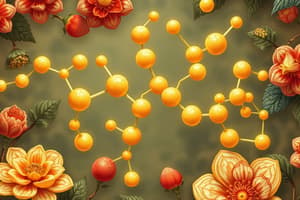Podcast
Questions and Answers
Which of the following molecules is NOT a macromolecule?
Which of the following molecules is NOT a macromolecule?
- Protein
- Lipid
- Polysaccharide
- Glucose (correct)
Are we allowed to eat the food in the lab after the experiment?
Are we allowed to eat the food in the lab after the experiment?
False (B)
What is a polymer?
What is a polymer?
a long molecule that consists of repeating units
Which one of these groups is an aldehyde?
Which one of these groups is an aldehyde?
What forms after the glycosidic linkage reaction between glucose and galactose is complete?
What forms after the glycosidic linkage reaction between glucose and galactose is complete?
What color indicates the presence of a high level of simple sugars using Benedict's reagent?
What color indicates the presence of a high level of simple sugars using Benedict's reagent?
Which of the following is a carbohydrate?
Which of the following is a carbohydrate?
What is the difference between alpha and beta glucose?
What is the difference between alpha and beta glucose?
What does insoluble fiber refer to?
What does insoluble fiber refer to?
What do you call a sample for which no response is expected?
What do you call a sample for which no response is expected?
Multiple amino acids are linked together by?
Multiple amino acids are linked together by?
The linear sequence of amino acids within a protein is considered the ____ structure of the protein.
The linear sequence of amino acids within a protein is considered the ____ structure of the protein.
Which level of protein structure is formed by the weak bonds between oxygen and hydrogen atoms within the polypeptide backbone?
Which level of protein structure is formed by the weak bonds between oxygen and hydrogen atoms within the polypeptide backbone?
Which of the following is a secondary protein structure?
Which of the following is a secondary protein structure?
What is the purpose of a positive control?
What is the purpose of a positive control?
Lipids are mostly composed of?
Lipids are mostly composed of?
Which of these is a structure of trans fat?
Which of these is a structure of trans fat?
Which food contains carbohydrates, proteins, and fats?
Which food contains carbohydrates, proteins, and fats?
Which of the samples contains no macromolecules at all?
Which of the samples contains no macromolecules at all?
Was your hypothesis right: Alice's food contains mostly complex carbohydrates?
Was your hypothesis right: Alice's food contains mostly complex carbohydrates?
What should Alice add to her salad to provide the macromolecules she needs?
What should Alice add to her salad to provide the macromolecules she needs?
Flashcards are hidden until you start studying
Study Notes
Food Macromolecules
- Glucose is not classified as a macromolecule.
- Consumption of food in lab settings is prohibited post-experiment.
- Polymers are long molecules composed of repeating units.
- Group A is identified as an aldehyde group.
- The glycosidic linkage between glucose and galactose results in water and lactose.
- A red color in Benedict's reagent indicates a high level of simple sugars.
- Sucrose is categorized as a carbohydrate.
- Alpha and beta glucose differ in the position of the hydroxyl group on Carbon 1.
- Insoluble fiber is primarily represented by cellulose.
- Negative control refers to a sample expected to show no response.
- Amino acids form peptide bonds, producing one water molecule when linked.
- The primary structure of a protein is its linear sequence of amino acids.
- Secondary structure is defined by the weak bonds between oxygen and hydrogen in the polypeptide backbone.
- An example of a secondary protein structure is an alpha helix.
- The purpose of a positive control is to confirm that negative results from tests are valid.
- Lipids are predominantly composed of non-polar substances.
- Group C identifies a structure of trans fat.
- Milk contains a combination of carbohydrates, proteins, and fats.
- Water is the only sample in this context that contains no macromolecules.
- The hypothesis regarding Alice's food containing mostly complex carbohydrates was confirmed as correct.
- To enhance the macromolecule content of her cabbage salad, Alice should add eggs and avocado.
Studying That Suits You
Use AI to generate personalized quizzes and flashcards to suit your learning preferences.




